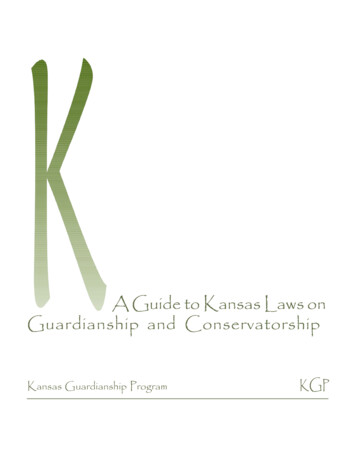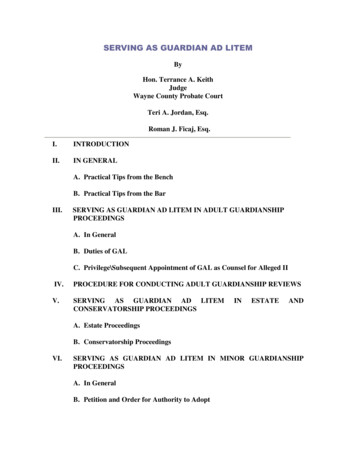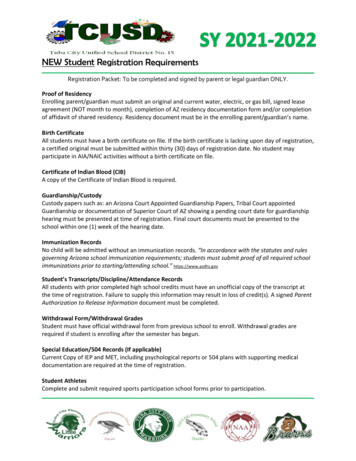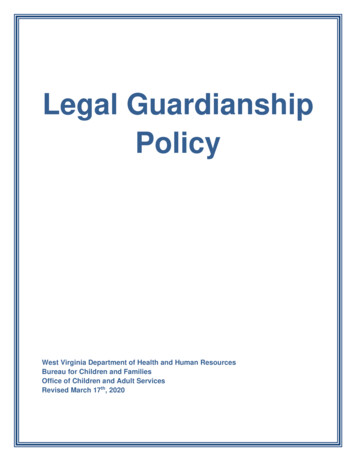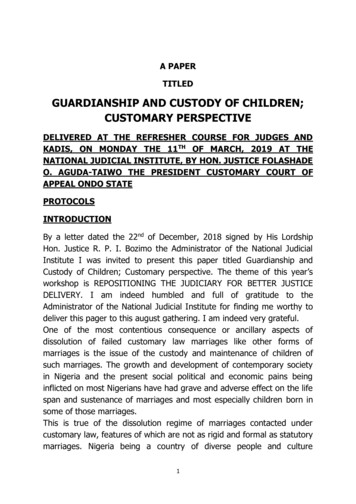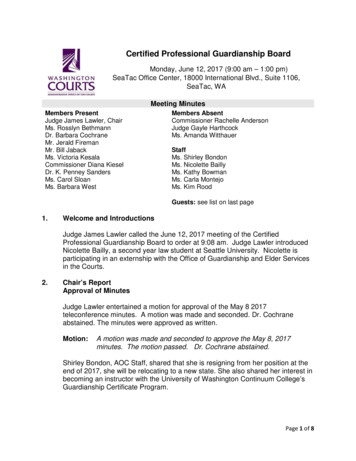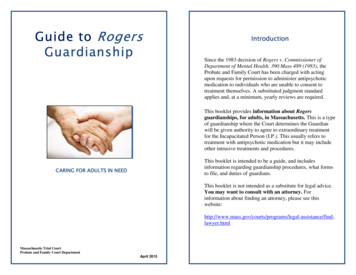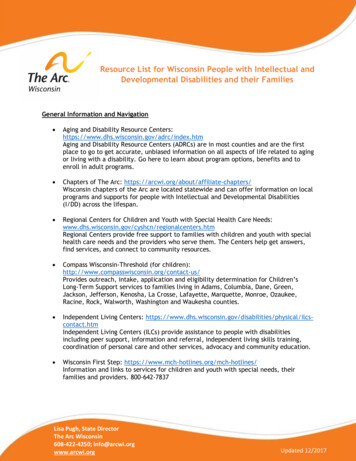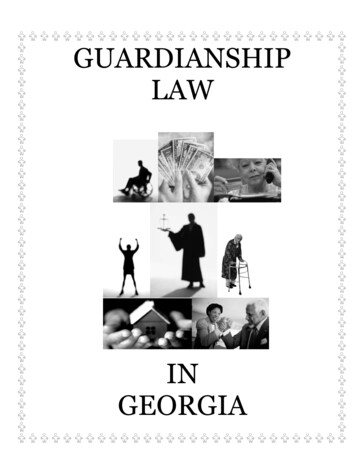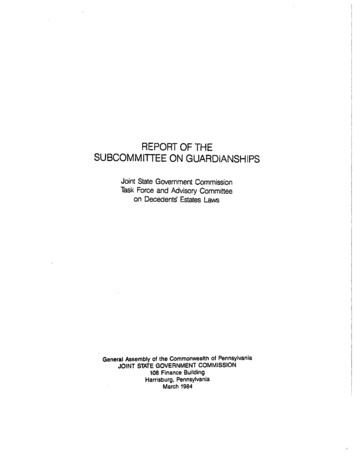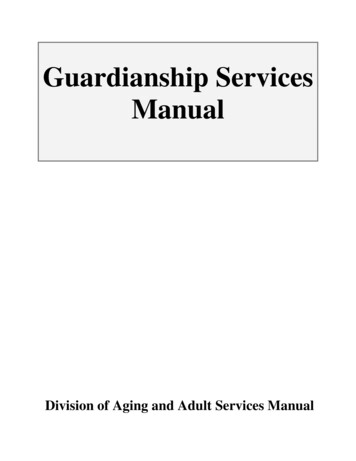
Transcription
Guardianship ServicesManualDivision of Aging and Adult Services Manual
North Carolina Division of Aging and Adult ServicesFamily Services ManualVolume V: Adult and Family ServicesChapter VIII: GuardianshipTABLE OF nning for Guardianship and GuardianshipProceedings6610PAGEA.Population Covered by Guardianship Laws1B.Criteria for Determining Whether or Not AGuardian Is Needed11.Definition of Incompetency12.Alternatives to Guardianship3Development of a Guardianship Plan5C.1.Review of Person’s Mental andPhysical Condition5Examination and Inventory of Person’sFinancial Resources63.Types of Guardianship Which May Be Requested84.Scope of Guardian’s Authority125.Recommendation of Whom Should Be AppointedGuardian(s)142.D.Proceedings to Determine Incompetence201.Venue202.Petition223.Issuance and Service of Notice254.Multidisciplinary Evaluation265.Hearing on Petition for Adjudication29
North Carolina Division of Aging and Adult ServicesFamily Services ManualVolume V: Adult and Family ServicesChapter VIII: GuardianshipTABLE OF CONTENTSTOPICIII.5-1-05SECTIONPAGEE.Appointment of Guardian32F.Interim Guardianship37G.Restoration of Competency41H.Removal and Resignation of Guardians;Estates Without Guardians43Authority and Responsibility of the GuardianA.6620Guardian of the Person31.Clerk’s Order42.Authority and Responsibility of Guardianof the Person5a.Custody of ward’s person; care, comfortand maintenance of ward5b.Ward’s place of abode8c.Consent or approval for professionalcare, counsel treatment or serviceError! Bookmark not defined.d.Authority and Responsibility RegardingDeath of Ward24Responsibility to Make Status Reports28e.3.Guardian’s Reimbursement for Expenses304.Coordination between Guardian of Personand Guardian of Estate31Inter-County Cooperation315.
North Carolina Division of Aging and Adult ServicesFamily Services ManualVolume V: Adult and Family ServicesChapter VIII: GuardianshipTABLE OF CONTENTSTOPICB.C.IV.V.5-1-05SECTIONPAGEGuardian of the Estate431.Clerk’s Order442.Authority and Responsibility of Guardianof the Estate45a.Management of ward’s estate45b.Advancements of income to certainparties513.Coordination with Guardian of the Person524.Responsibilities on Death of Ward535.Responsibility to File Accounts with theClerk of Court54Duties as Required by DHHS Administrative RulesLiability of the Guardian586630A.Guardian of the Person1B.Guardian of the Estate2C.Delegation of Duties to Staff3Bonds and InsuranceA.Bond664011.Who Must Post Bond12.Terms and Conditions of Bond23.DHHS Blanket Bond5
North Carolina Division of Aging and Adult ServicesFamily Services ManualVolume V: Adult and Family ServicesChapter VIII: GuardianshipTABLE OF CONTENTSTOPIC4.B.VI.SECTIONPosting of BondPAGE7Liability Insurance81.Purpose of Insurance82.Obtaining Liability Insurance Coverage8Record-KeepingA.5-1-056650Central Registry of Guardianships Heldby the Agency1B.Master Index2C.Individual Case Record3VII.Private Organizations Established to Serve as Guardian6660VIII.Legal Alternatives and Supplements6670A.Introduction1B.Civil Commitments11.2.Statutory Requirements for VoluntaryAdmissions and Discharges1Statutory Requirements for InvoluntaryCommitments2C.Powers of Attorney5D.Advance Directives10E.Substitute Payee12
North Carolina Division of Aging and Adult ServicesFamily Services ManualVolume V: Adult and Family ServicesChapter VIII: GuardianshipAppendicesIX.5-1-05AppendicesA.G.S. Chapter 35A: Incompetency and Guardianship, Subchapters I, II, and IIIB.Forms for Petitions and OrdersC.DHHS-7016, Notification of Appointment of Disinterested Public AgentGuardianD.Sample Status Report FormE.Sample Certificate of Receipt of Status ReportF.Financial Report Form: AOC-E-506, AccountG.Social Work Practice Guidelines for Multidisciplinary Evaluations ofDevelopmentally Disabled Adults for North Carolina GuardianshipH.G.S. 122C-3(14), Definition of “Facility” from Mental Health, DevelopmentalDisabilities, and Substance Abuse Act of 1985I.Mental Health, Developmental Disabilities, and Substance Abuse Act of 1985,Excerpts from Article 5, Procedures for Admission and Discharge of ClientsJ.AOC Forms for Involuntary CommitmentK.G.S. 90-Article 23, Right to Natural Death; Brain Death (Living Will), andstatutory form.L.G.S. 32A-Article 3, Health Care Powers of Attorney, and statutory form.M.Sample Guidelines/Procedures for Decision MakingN.Attending Physician’s Statement Recommending Treatment for WardNon-Attending Physician’s Statement Recommending Treatment for WardO.Physician’s Affidavit and Non-Attending Physician’s AffidavitP.Sample Format to Facilitate Inter-County Cooperation Around GuardianshipServices ProvisionQ.Sample Format, Cooperative Agreement
North Carolina Division of Aging and Adult ServicesFamily Services ManualVolume V: Adult and Family ServicesChapter VIII: ardianship involves the provision of services to individuals who are alleged to beincompetent and their families. It includes legal proceedings in which an adult isdeclared incompetent by the court and another party is given responsibility for dutiesrelative to the adult’s personal affairs and/or property. The nature and scope of aguardian’s responsibility are determined by the court, based on applicable provisions ofthe law and the circumstances of the individual case. Guardianship ends with the deathof the incompetent adult or with a judicial restoration of the adult’s competency.The legal determination that an adult is incompetent means that the adult is consideredincapable of making important decisions concerning his/her personal welfare and/orfinancial resources. Authority may be given to a guardian to make decisions such aswhere the adult will live, including the geographical area and type of living arrangement;how the adult’s income will be spent; and whether the adult will have recommendedmedical treatment or surgery. To the extent that the guardian is given authority overthese and other areas of the adult’s life, the adult no longer has the right to makedecisions in those areas. Because of the effect of declaring an adult legally incompetentand giving his/her authority to make decisions to a guardian, guardianship should beconsidered only when other, less drastic methods of assisting adults are not sufficient.An incompetent adult’s relatives, and others personally concerned with the adult’swelfare, should be encouraged to assume primary responsibility for planning forguardianship. The agency’s role should include providing information aboutguardianship and alternatives to guardianship to help the family in deciding on the mostappropriate course of action; providing specific information about what is expected of aguardian and helping the family to determine which family member should serve asguardian; assisting the family in initiating and participating in the guardianship courtproceedings when the family’s decision is to pursue guardianship; and acting as anongoing resource to the family when assistance is needed in implementing and carryingout the court’s guardianship order.The county department of social services and other local human services agencies mayassume one or more roles in a guardianship case, i.e. petitioner, designated agency,guardian. There are different statutory responsibilities relative to each of these roles.Also, if a director or assistant director of a county department of social services or otherlocal human services agency is appointed guardian, there is a statutory authorization andrequirement to serve.Chapter 35A of the General Statutes contains North Carolina’s laws dealing with theadjudication of incompetency, a prerequisite for appointment of a guardian. Subchapter Iof Chapter 35A contains procedures for the adjudication of incompetence. Provisions for-1-
North Carolina Division of Aging and Adult ServicesFamily Services ManualVolume V: Adult and Family ServicesChapter VIII: GuardianshipIntroduction66004-1-05appointment of a guardian(s) and the powers and duties of the guardian(s) are containedin Subchapter II.It is important to be knowledgeable about the guardianship laws in order to use themappropriately in providing assistance to incompetent adults and their families and tounderstand and carry out the responsibilities local human service agencies may have inproviding guardianship services. The relevant statutes should be reviewed in preparationfor providing guardianship services.In addition to the requirements in the guardianship law, the Department of Health andHuman Services has established rules regarding the responsibilities of human servicesagencies in pursuing guardianship and in serving as guardian. Local human servicesagencies, including county departments of social services, area mental health agencies,local health departments, and county departments of aging must comply with these ruleswhen petitioning for guardianship and when appointed to serve as guardian.This manual chapter contains statutory requirements, state policies and social workpractice guidelines to be used when providing guardianship services. Appendicesfollowing the manual chapter contain resource information for use by local humanservice agencies.-2-
North Carolina Division of Aging and Adult ServicesFamily Services ManualVolume V: Adult and Family ServicesChapter VIII: GuardianshipPlanning for Guardianship and Guardianship ProceedingsII.66105-1-05Planning for Guardianship and Guardianship ProceedingsA.Population Covered by Guardianship Law1.Statutory RequirementUnder G.S. Chapter 35A, proceedings for adjudication of incompetenceand appointment of a guardian may be brought for incompetent adults andchildren at least age 17 ½ and incompetent by reason other than theirminority. Incompetency is defined in G.S. 35A-1101(7)(8). (SeeParagraph B.1.a. below.)2.State PolicyNone3.Social Work Practice GuidelinesAlthough G.S. Chapter 35A deals primarily with guardianship for adults,it may also be used to petition for a guardian to be appointed for anincompetent minor. A guardianship petition for adjudication ofincompetence and appointment of a guardian may be filed for anincompetent minor who is within six months of his/her eighteenth birthday(See G.S. 35A-1105). This may be helpful in planning for an incompetentchild who will need a guardian as an adult. Initiating the proceedingbefore the person’s eighteenth birthday would enable a guardian to beappointed and assume responsibility when the person becomes eighteen.This would prevent a gap in decision-making authority for the personwhich may otherwise occur if the proceeding is not initiated until theperson’s eighteenth birthday.B.Criteria for Determining Whether or Not A Guardian Is Needed1.In evaluating whether to pursue guardianship for an adult or an incompetentminor who is within six months of his/her eighteenth birthday, the followingissues should be considered. The results of the review of each of these issuesshould be documented.Definition of Incompetencya.Statutory Requirement“The term ‘incompetent adult’ means an adult or emancipatedminor who lacks sufficient capacity to manage the adult’s own-1-
North Carolina Division of Aging and Adult ServicesFamily Services ManualVolume V: Adult and Family ServicesChapter VIII: GuardianshipPlanning for Guardianship and Guardianship Proceedings66105-1-05affairs or to make or communicate important decisions concerningthe adult’s person, family, or property whether the lack of capacityis due to mental illness, mental retardation, epilepsy, cerebralpalsy, autism, inebriety, senility, disease, injury, or similar causeor condition. [G. S. 35A-1101(7)]The term ‘incompetent child’ means a minor who is at least 17 ½years of age and who, other than by reason of minority, lackssufficient capacity to make or communicate important decisionsconcerning the child’s person, family, or property whether the lackof capacity is due to mental illness, mental retardation, epilepsy,cerebral palsy, autism, inebriety, disease, injury, or similar causeor condition”. [G.S. 35A-1101(8)]b.State PolicyNonec.Social Work Practice Guidelines(1)The statutory definitions of incompetency and of conditionswhich may cause incompetency should be reviewed todetermine whether the person meets the criteria. See pages1 and 2 of Appendix A for statutory definitions ofconditions which may cause incompetency.(2)When the person does not meet the criteria in theapplicable statutory definition of incompetency,guardianship should not be pursued. Depending on theperson’s needs and circumstances, one or more of thefollowing may be an appropriate means of assistance:(a)Assumption of increased responsibility by familymembers and/or other service providers to assist theperson with day-to-day living and with managementof financial matters;(b)Execution of a power of attorney (for moreinformation on powers of attorney see section6670);(c)Establishment of a special bank account (joint bankaccount requiring two signatures, direct deposit of-2-
North Carolina Division of Aging and Adult ServicesFamily Services ManualVolume V: Adult and Family ServicesChapter VIII: GuardianshipPlanning for Guardianship and Guardianship Proceedings66105-1-05benefit checks, automatic drafts to a specifiedparty);(d)2.Appointment of a payee by a government agency tohandle financial benefits coming from that agency.Alternatives to Guardianshipa.Statutory RequirementNoneb.State PolicyNonec.Social Work Practice GuidelinesBefore initiating a petition for adjudication of incompetence for aperson who meets criteria in the applicable statutory definition ofincompetency, careful consideration should be given as to whetherthe person’s need for assistance can be met through other means.Proceedings for adjudication of incompetence and appointment ofa guardian should be initiated only when other less restrictiveforms of intervention for an incompetent person are determined tobe inappropriate or inadequate. The appropriate use of alternativesto guardianship depends on the nature of the incompetent person’sabilities and limitations, income and resources. Some alternativesto guardianship and examples of circumstances in which each maybe appropriate include:(1)Appointment of a payee to handle financial benefitscoming from a government agency.If the person’s only income is Social Security or publicassistance, a substitute payee may be appointed to managethe assistance payment. This may be the only interventionneeded for a person who is able to take care of personalneeds; however, if the person requires more assistance andoversight, a guardian of the person may be needed inaddition to a substitute payee. (See Subsection C.3.a ofthis section, for information about guardians of the person.)-3-
North Carolina Division of Aging and Adult ServicesFamily Services ManualVolume V: Adult and Family ServicesChapter VIII: GuardianshipPlanning for Guardianship and Guardianship Proceedings(2)66105-1-05The Adult Protective Services law (G.S. 108A, Article 6) toauthorize provision of needed essential services on a shortterm basis.This law provides a mechanism for quick intervention fordisabled adults who have been abused, neglected orexploited. Essential services which may be provided todisabled adults in need of protection include “social,medical, psychiatric, psychological or legal servicesnecessary to safeguard the disabled adult’s rights andresources and to maintain the physical or mental well-beingof the individual”. [G.S. 108A-101(i)]. Such services maybe provided with the adult’s consent or, if the adult lacksthe capacity to consent, under a court order which is ineffect for 60 days and may be extended an additional 60days for good cause shown. (See Chapter VII, Volume Vof the Family Services Manual for information about AdultProtective Services.)If an adult’s incompetency results from a condition whichmay be corrected or improved with the provision ofservices, i.e. medical treatment, better nutrition, drugmanagement, etc., and if the adult is disabled and has beenabused, neglected or exploited, it may be appropriate forinitial intervention to be through the adult protectiveservices law.If incompetency results from a condition which is longterm and unlikely to improve (i.e. Alzheimer’s disease), itmay be more appropriate to initiate a guardianshipproceeding.In such instances, if the adult needs immediate assistance toprotect his/her person or property, Interim Guardianshipmay be an appropriate means to address the adult’s needfor assistance rather than filing petitions for both protectiveservices and guardianship. (See Subsection F of thissection for information about Interim Guardianship.)Consideration should be given to whether the adult hasincome which could not be handled by a payee and/orproperty which needs to be protected and/or managed. Theadult protective services law does not provide a basis foranyone to assume control over an adult’s financial-4-
North Carolina Division of Aging and Adult ServicesFamily Services ManualVolume V: Adult and Family ServicesChapter VIII: GuardianshipPlanning for Guardianship and Guardianship Proceedings66105-1-05resources. Therefore, guardianship may be pursued in anyinstance in which an incompetent adult needs someone tomanage his/her estate. Interim guardianship may be neededin situations where property/income needs to beprotected/managed on an emergency basis.(3)C.Advance directives may be an alternative to guardianship.These legal documents give competent individuals theopportunity to plan for future incapacity and designatesurrogate decision makers who will carry out their personaland business affairs as they wish them carried out. Thesedirectives include, the durable power of attorney, healthcare power of attorney, the advance instruction for mentalhealth treatment, and the Living Will. These documentsmay be used to assist adults whose incapacity is not longterm and can be improved with medical care, diet, etc. It isimportant to remember that adults must be competent todesignate an advance directive. (See to Section 6670,Alternatives and Supplements for more information aboutadvance directives.)Development of a Guardianship PlanA written guardianship plan may be developed prior to initiating a petition foradjudication of incompetency and appointment of a guardian. The plan shoulddescribe the person’s mental and physical condition, recommended type ofguardianship (see paragraph 3. of this section for information about types ofguardianships), scope of the guardian’s authority to best meet the person’s needswithout assuming any more control than necessary, and the most appropriateparty to serve as guardian. The plan should be developed in consultation withfamily members when possible and with input from any other communityagencies involved in providing services to the person.1.Review of Person’s Mental and Physical Conditiona.Statutory RequirementNoneb.State PolicyNonec.Social Work Practice Guidelines-5-
North Carolina Division of Aging and Adult ServicesFamily Services ManualVolume V: Adult and Family ServicesChapter VIII: GuardianshipPlanning for Guardianship and Guardianship Proceedings66105-1-05A review should be made of the person’s mental and physicalcondition, focusing on his ability to be responsible for personalwelfare and to manage financial affairs.Based on this review, a determination should be made of the extentto which the person is able to be responsible for decisions abouthis personal welfare. If the person needs assistance in this area,the type and degree of assistance needed should be noted in theguardianship plan. For example, the person may be able to makedecisions about daily living needs, but not about medical care andtreatment. Information about the person’s mental abilities andlimitations will be needed for the petition.If there is any question about the nature or degree of the person’sabilities and limitations, a multidisciplinary evaluation should berequested. The request for a multidisciplinary evaluation is madein writing to the clerk of court at the time of or within ten daysafter a guardianship petition is filed. (See Subsection D.4. of thissection for information about multidisciplinary evaluations.)When it is decided that a multidisciplinary evaluation should berequested, the written guardianship plan should include thisrecommendation.2.Examination and Inventory of Person’s Financial Resourcesa.Statutory RequirementNoneb.State PolicyNonec.Social Work Practice GuidelinesA review should be made to determine the nature and extent of theperson’s financial resources. All property owned by the personshould be identified and inventoried. The inventory should includean itemized description of all property, its location and value. Theamount and sources of income and any other financial resourcesshould be identified and noted.-6-
North Carolina Division of Aging and Adult ServicesFamily Services ManualVolume V: Adult and Family ServicesChapter VIII: GuardianshipPlanning for Guardianship and Guardianship Proceedings66105-1-05An inventory of the person’s assets is necessary to assist thepetitioner in determining whether a guardian will be needed tomanage extensive resources, or whether other alternatives may bemore appropriate. If it is determined that the person has extensivefinancial assets and the person is not capable of managing theseassets, a guardian of the estate may be appropriate. Knowledge ofthe person’s assets is also necessary for the petition which requiresa general statement of the person’s assets. This statement will bereviewed by the clerk in determining what kind of guardianship isneeded.In most instances the location and value of real property is a matterof public record. Inquiries should be made of the county tax officeand/or register of deeds office in the county where the property islocated. If the property is out of state, the appropriate authoritiesin that state should be contacted.The value of tangible personal property (i.e. furnishings, jewelry,automobiles) can be obtained by contacting a professionalappraiser of such items. In instances where an appraisal cannot bemade, a list of the property with an estimate of its value may besufficient for the petition. A more accurate inventory of thepersonal property may be done at the time of the 90 dayaccounting to the clerk.In instances where resources are known to exist but cannot beverified, such as bank accounts or trust accounts, because of a lackof legal authority to access this information, an estimate may besufficient for the petition. Once a guardian of the estate/generalguardian is appointed, the guardian will have authority to obtainthis information.A determination should be made of the extent to which the personcan manage his own financial resources based on this review andinventory and the review of the person’s mental and physicalcondition. If the person needs assistance in managing his estate,the type and degree of assistance needed should be noted in theguardianship plan. For example, a person may be able to beresponsible for a small amount of money on a weekly basis topurchase food and personal items, but may need someone toassume responsibility to pay for housing, medical care, and otherexpenses.-7-
North Carolina Division of Aging and Adult ServicesFamily Services ManualVolume V: Adult and Family ServicesChapter VIII: GuardianshipPlanning for Guardianship and Guardianship Proceedings3.66105-1-05Types of Guardianship Which May Be Requesteda.Statutory RequirementThere are three types of guardians: guardian of the person,guardian of the estate and general guardian.(1)A guardian of the person is appointed “solely for thepurpose of performing duties related to the care, custodyand control of a ward”. [G.S. 35A-1202(10)]b.(2)A guardian of the estate is appointed “solely for thepurpose of managing the property, estate and businessaffairs of a ward.” [G.S. 35A-1202(9)](3)‘General guardian’ means a guardian of both the estate andthe person. [G.S. 35A-1202(7)](4)The clerk of court may also order that a limited guardian beappointed. If the clerk orders a limited guardianship asauthorized in [G. S. 35A-1212(a)] the clerk may order thatthe ward retain certain legal rights and privileges to whichthe ward was entitled before the ward was adjudgedincompetent. [G. S. 35A-1215(b)]State PolicyNonec.Social Work Practice GuidelinesThe guardianship statute authorizes the clerk of court to order thata guardianship be limited based on the strengths and limitations ofthe adult. This allows the ward to retain certain legal rights andprivileges held prior to the adjudication of incompetence. Thisalso limits the guardian’s decision making authority to only thoseareas where the ward lacks the capacity to make and communicateimportant decisions.The type of guardianship that should be recommended for an adultdepends on the nature and extent of the adult’s capacity to makeand communicate decisions about the adult’s person and/orfinancial affairs. Guardianships should be tailored to meet thespecific needs of the adult and should not be a “one size fits all”-8-
North Carolina Division of Aging and Adult ServicesFamily Services ManualVolume V: Adult and Family ServicesChapter VIII: GuardianshipPlanning for Guardianship and Guardianship Proceedings66105-1-05approach. If an adult lacks the capacity to make and communicatedecisions in all areas, he or she may benefit from a plenary (full)guardianship. However, every attempt should be made tomaximize the rights of the adult by allowing the adult to retain asmuch control over decision making as is reasonable andappropriate.The new form, AOC-SP-208, Guardianship CapacityQuestionnaire, may assist in gathering information about theadult’s functional abilities, strengths and limitations. TheQuestionnaire does not replace any other tools or assessments thatmay assist with determining the level of the adult’s functioning.The Questionnaire may also assist with determining whether lessintrusive alternatives than guardianship, such as, durable power ofattorney, health care power of attorney, representative payee, maybe more appropriate to meet the adult’s needs. The Questionnairelists several areas of domains, such as, language andcommunication, nutrition, independent living, financial, personalhygiene, and personal safety that are to be assessed to determinethe adult’s functional capacity. For more information about theGuardianship Capacity Questionnaire, refer to D.2., Petition and toAppendix B.A guardianship may be limited at the time a petition for theadjudication of incompetence is filed. The petition should indicatethose areas where the adult lacks the capacity to make andcommunicate decisions or manage his or her own affairs. Theseare the areas where the adult will retain certain legal rights andprivileges to make and communicate his or her own decisions.The petition should also indicate those areas where the adult willrequire a guardian to make and communicate decisions on his orher behalf. These are the areas the guardian will have decisionmaking authority.A guardianship may also be modified after the appointment torestore more rights to the ward, and limit the powers and duties ofthe guardian. To modify a guardianship after the appointment, amotion in the cause may be filed with the clerk having jurisdictionin the matter. The motion must indicate the specific areas wherethe ward has the capacity to make and communicate decisions, andthose areas where the adult continues to require a surrogatedecision maker. For example, the ward may have regained the-9-
North Carolina Division of Aging and Adult ServicesFamily Services ManualVolume V: Adult and Family ServicesChapter VIII: GuardianshipPlanning for Guardianship and Guardianship Proceedings66105-1-05capacity to make and communicate important decisions about herbasic needs, where she will live, and with whom she will associate,but continues to require a guardian to make decisions aboutmedical care.A functional assessment of an individual’s capacity should assistwith determining what type of guardianship is appropriate to meethis or her needs, allowing the guardianship to be “tailored to fit theindividual”. A functional assessment of an adult’s capacityprovides a clearer picture of what he or she can and cannot do thandoes a general diagnosis statement from a physician.An adult may benefit from a limited guardianship of the person, ora limited guardianship of the person and a full guardianship of theestate. An adult may benefit from a guardian of the person and theestate. There may be two separate guardians appointed or oneperson to act as a general guardian. There are a number of waysthe guardianship may be tailored to benefit the adult.When determining the type of guardianship that will benefit theadult consideration should be given to: The adult’s cognitive functioning.Does the adult possess the intellectual ability to make andcommunicate important decisions about the adult’s person,family or property? For example, does the adult have amental health disorder or disability that interferes with hisor her understanding or reasoning ability to make andcommunicate decisions? The adult’s functional capacity.Does the adult have deficits in functioning (social, mental,physical, ADLs/IADLs, environment, economic)? To whatextent do the deficits affect the adult’s ability to managepersonal and financial affairs, and make and communicateimportant decisions? The adult’s current condition or status.Does the adult have a diagnosis as determined from theareas above that currently impairs his or her ability to makeand communicate important decisions or manage person oraffairs? Does the diagnosis continue to impair the adult’sability to make and communicate decisions or manage his- 10 -
North Carolina Division of Aging and
Social Work Practice Guidelines. Although G.S. Chapter 35A deals primarily with guardianship for adults, it may also be used to petition for a guardian to be appointed for an incompetent minor. A guardianship petition for adjudication of incompetence and appointment of a guardian may be filed for an
